For more than two decades, Judith Susan Sheindlin, known to millions as Judge Judy, ruled the daytime airwaves with an iron gavel and an unflinching tongue. Her signature wit, scathing remarks, and unapologetic brand of “tough love justice” transformed a simple televised court format into a billion-dollar phenomenon. At the height of her career, she became one of the highest-paid television personalities in history, earning an estimated $47 million annually — and turning her into a cultural icon synonymous with authority, discipline, and control.

But behind the polished bench and pearls, a darker story is beginning to unfold. Recent reports have surfaced detailing a series of explosive lawsuits involving her production company and former associates, exposing the internal strife that has long simmered beneath the surface of her multimillion-dollar franchise. Former producers, business partners, and agents are accusing Sheindlin of betrayal, claiming they were cut out of massive profit deals, including the shocking sale of Judge Judy rerun rights for nearly $100 million. The fallout has turned trusted allies into fierce adversaries, igniting a legal war that could forever tarnish her pristine reputation.
The once untouchable queen of courtroom television is now facing accusations of greed, hypocrisy, and manipulation. Former staffers have stepped forward to describe a work environment dominated by fear and intimidation — one where Judy’s fiery personality and relentless drive for perfection came at a steep cost. “She demanded fairness on camera,” one ex-employee alleged, “but behind the scenes, it was her way or no way.” Crew members claim that while Judy amassed a personal fortune, their own wages remained stagnant, and their concerns were dismissed without empathy — a jarring contrast to the values she preached daily to millions of viewers.
Compounding the controversy are viral social media clips that have reignited debate about her on-screen persona. Once admired for her quick wit and sharp comebacks, Judy is now being reframed as a bully by younger audiences who view her harsh approach as outdated and insensitive. On platforms like TikTok and X (formerly Twitter), old footage of her berating litigants is being dissected and criticized, sparking conversations about the blurred lines between entertainment and humiliation.

Behind closed doors, the drama continues to unfold. Insiders reveal that Judy’s personal life mirrors the fiery temperament she displayed on screen. Her decades-long marriage to fellow judge Jerry Sheindlin has reportedly been marked by explosive arguments and periods of estrangement. “They love hard and fight harder,” said a close friend. “Judy’s intensity doesn’t turn off when the cameras stop rolling. She’s brilliant and relentless — but she can also be impossible.”
The scrutiny surrounding her empire has intensified as insiders question whether Judge Judy’s empire was built on empowerment — or exploitation. Her trademark mantra, “If it doesn’t make sense, it’s not true,” has now become the rallying cry of those demanding accountability from the woman who once sat in moral judgment over millions.

Still, those close to her insist that Judy remains unfazed by the criticism, maintaining that her success came from hard work and an uncompromising belief in justice. “She built her empire from nothing,” said one former colleague. “She’s not going to let anyone take that away from her.”
As the headlines continue to pour in, the question looms larger than ever: How will history remember Judge Judy? Will she be celebrated as a groundbreaking woman who redefined courtroom television and gave voice to common sense justice — or condemned as a ruthless mogul who blurred the lines between fairness and fame?
The gavel may have fallen on her iconic show, but the case of Judge Judy’s legacy is far from closed. With each new revelation, the once-untouchable arbiter of truth finds herself standing trial in the only courtroom she can’t control — the court of public opinion.





